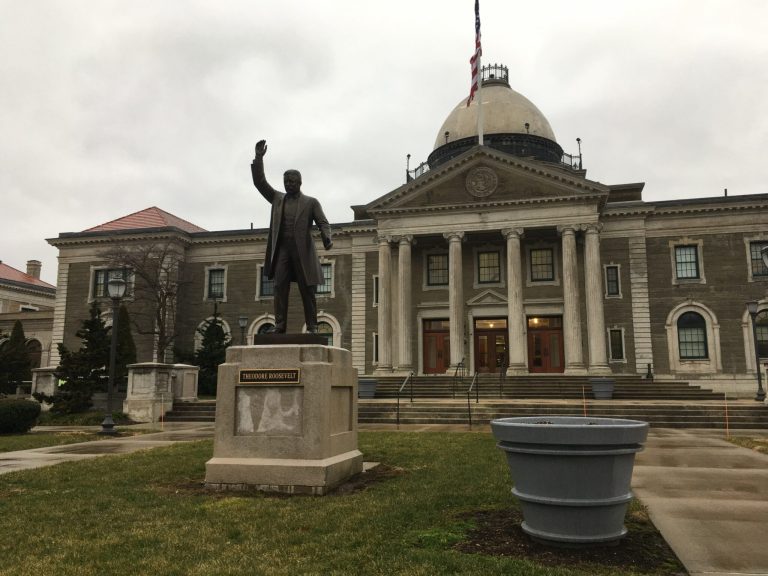
Nassau County legislators advanced a proposed law to ban mask-wearing in public Monday, potentially making the act a misdemeanor with upwards of a $1,000 fine for those seeking to conceal their identity.
The measure faced the Nassau County Public Safety and Rules committees where Republican legislators greenlighted it and Democrats on the committees abstained due to enforcement concerns.
The county’s “Mask Transparency Act” would prohibit the wearing of masks in public spaces for individuals intending to conceal their identity. The law would not be enforced for individuals wearing masks for health or religious reasons.
County Legislator Mazi Melesa Pilip (R–Great Neck) offered background to the county’s law, explaining how before the COVID-19 pandemic face masks were prohibited in New York State. This law was repealed in the state due to the pandemic.
“The goal of that time was to help to protect the help and safety of New Yorkers and to eliminate any doubts that wearing protective masks to reduce the transmission of the COVID-19 virus was in accordance with the New York State law,” Pilip said. “It was the right move at the time of great uncertainty.”
New York State has proposed reinstating the mask ban without a timeline. Gov. Kathy Hochul said last month that state legislators would be discussing the reinstatement.
Pilip said this law needs to be revisited now that outbreaks have diminished and antisemitism is rising. She said this is within the county’s power and does not need to be held off until the state acts.
Pilip said antisemitism, specifically after Oct. 7, has spiked with individuals concealing their faces in their public displays of hate.
“A common trait that accompanied this horrific behavior is that the people, be they protesters or paid actors, hid behind masks emboldened by their anonymity,” Pilip said. “Masks help ensure that otherwise criminal behavior goes unpunished because they work. That’s why criminals are wearing them because masks make it difficult if not impossible in many cases for police and prosecutors to identify criminal actors and tie them to a criminal activity.”
The legislator cited the example of the mass arrest of 300 protesters at Columbia University in April after they occupied a campus building. In June Manhattan District Attorney Alvin Bragg dropped the charges against 31 of the 46 individuals facing legal action due to a lack of evidence.
Legislator Siela Bynoe (D-Westbury) questioned how the law would be incorporated into police training to differentiate who is wearing a mask for health or concealing their identity.
“If they’re just simply wearing a mask and they seem suspicious, which is subjective, they could be then, I guess, in some way identified as someone based on someone else’s subjection of whether they are loitering or they seem suspicious. In fact, then they could have this issue thrusted on them and then, in fact, be in some way or another subjected to a fine and a misdemeanor?” Bynoe asked.
In response to Bynoe’s question, it was clarified that a mask crime would be an added charge to someone who is being charged with other crimes.
But Bynoe said the proposed law’s language reads that wearing a mask is in itself a crime and would be enforceable not in tandem with another crime. She said that the intent of wearing a mask, which defines whether it would be a crime or not, can be subjective.
“But we know now that what I might see as intent might be different from someone else,” Bynoe said.
She cautioned that the law could potentially have a “chilling effect” on mask-wearing, deterring individuals from wearing masks and thus causing higher transmission of diseases, or subject people to unnecessary police interactions.
Nevertheless, she still expressed support for a law of this nature that is aimed at combatting criminal activity but not have adverse effects on the community.
Multiple residents spoke during the public comment period also expressing concerns with the bill, which included an infringement on their right to privacy for having to disclose medical histories to justify their mask-wearing.
Susan Gottehrer, Nassau County director of the New York Civil Liberties Union, called the ban “distinctly unpopular and for good reason.” She said this includes concerns over targeted and disproportionate treatment as well as health concerns.
“They prevent people from protecting their health, they have been used to squash political protest, to dox, surveil and retaliate against people with unpopular political beliefs, and in the jurisdictions where they already exist have been used to selectively enforce and criminalize people of color,” Gottehrer said.
She cited data from Long Island United to Transform Policing, which has identified bias in the Nassau County Police Department. She said this could impact mask ban enforcement as well.
The county Legislature will hold a hearing for the law at its meeting on Aug. 5. Presentations will be given at that meeting.
Minority Leader Delia DeRiggi-Whitton (D–Glen Cove) asked to have Nassau County Police Commissioner Patrick Ryder and a county attorney’s office representative to testify at the public hearing.
The bill is co-sponsored by the entire county Republican caucus, which holds a 12-7 majority in the Legislature.







With new COVID variants on the rise, this is a foolhardy move.